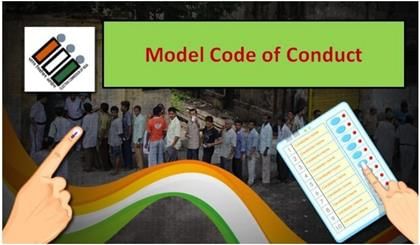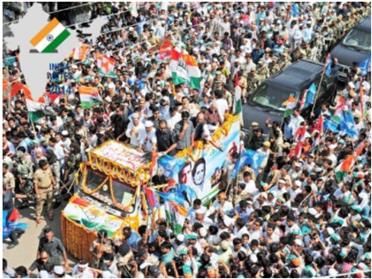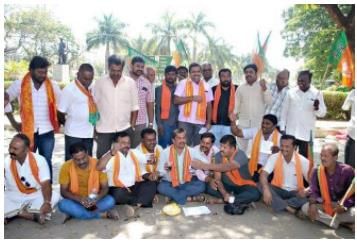Code of Conduct for Elections | Indian Polity for UPSC CSE PDF Download
What is Election Model Code of Conduct?
Model Code of Conduct (MCC) : The Election Commission of India releases the guidelines to conduct free and fair election in the country. These guidelines are also called election Model Code of Conduct (MCC). In this article, we have mentioned main points of model code of conduct for political parties and candidates.
Election Commission of India is a permanent and independent body. It is responsible for conducting the election of the Parliament, State Legislature, President and Vice President of India
What is the Model Code of Conduct?
The Election Commission of India releases the guidelines to conduct free and fair elections in the country. These guidelines give an overview to the political parties and candidates about what “do and don’t” before and during the election.
In other words, the Model Code of Conduct is a set of instructions to be followed by both candidates in the fray and political parties contesting elections. The Model Code of Conduct is a set of guidelines and instructions on campaigning, general conduct, and meetings etc. during elections. The Model Code of Conduct remains effective until the entire elections process is not completed.
The General Conduct for all Political Parties and Candidates are as follows
- No political party or candidate can secure votes on the basis of caste and religion. That is the reason that temples, mosques, churches and other religious places shall not be used for election propaganda/campaigning.
- No political party or candidate shall be involved in any such activity so that there is an atmosphere of hatred and tension among the people of different castes and religions.
- Political Parties and candidates will have the right to criticize the policies and programs, past records and work of their opposition parties. Parties and candidates shall refrain from commenting on the personal life or family of any candidate.
- Threatening voters, giving bribe, campaigning in the periphery of 100 meters from polling booths, organizing a public meeting within 48 hours of polling, and arranging transport “to and from” the polling booths is also prohibited.
- No political parties or candidates shall permit his followers to use the land, building, compound, wall, a vehicle without the permission of the property owner for pasting pamphlets, banners, displaying party flags, writing slogans etc.
- Political parties or candidates shall ensure that their supporters neither obstruct the meeting and rally of the opposition parties or candidates nor distribute pamphlets in the meeting organised by the opposition parties.

- Political parties or the candidates shall have to seek prior permission from the police or concerned authorities of the area before organizing the meeting at any place so that traffic and other necessary arrangements can be made.
- If a Political party or a candidate is about to organize the procession, then ‘it or he’ has to inform; (about its time, the path of procession, place of starting of the procession and the place where the procession will end) to the concerned authorities.
- Political parties or candidates shall ensure that the identity slip given to the voters on the day of polling shall be printed on the plain (white) paper. The Slip shall not have a name/symbol of any political party or the candidate.
- The Voters should not be served alcohol, etc. on the day of polling and 24 hours prior polling.

- The ruling party's ministers shall not use government machinery like government employees, vehicles, government buildings during elections campaigning.
- The ruling party shall not have a monopoly over public places, helipads, and aircraft, the candidates of other parties will also be able to use them with the same conditions as the ruling party is following.
- No advertisement will be published or displayed at the cost of public exchequer through newspapers & other media during the election. Other media will also not be used to disseminate the achievements of the government.
- The ministers and other authorities shall not sanction grants/payments out of discretionary funds from the date elections are announced by the commission.
- Since the elections dates are announced by the Election Commission, the ministers and other officials shall not do the following tasks;
(a) Announce any financial grant or any new scheme or promise thereof.
(b) Make any promise of construction of roads, provision of drinking water facilities etc.
(c) Lay foundation stones etc. of project or scheme of any kind (except civil servants).
(d) Make any ad-hoc appointments in government, public undertakings etc.
The commission shall announce the date of any election which shall be a date ordinarily not more than 3 weeks prior to the date on which the notification is likely to be issued in respect of such elections.
After reading the above points you may have understood that the Election Commission adopts the necessary measures to conduct fair and peaceful elections in the country. However, in practice, it has been observed that the guidelines issued by the Election Commission are not executed appropriately, which concludes that there is a strong need for the election reforms in the country.
|
151 videos|780 docs|202 tests
|
FAQs on Code of Conduct for Elections - Indian Polity for UPSC CSE
| 1. What is a Code of Conduct for Elections? |  |
| 2. Why is a Code of Conduct important for elections? |  |
| 3. Who is responsible for enforcing the Code of Conduct for Elections? |  |
| 4. What are some common provisions included in a Code of Conduct for Elections? |  |
| 5. How can the public contribute to upholding the Code of Conduct for Elections? |  |





















